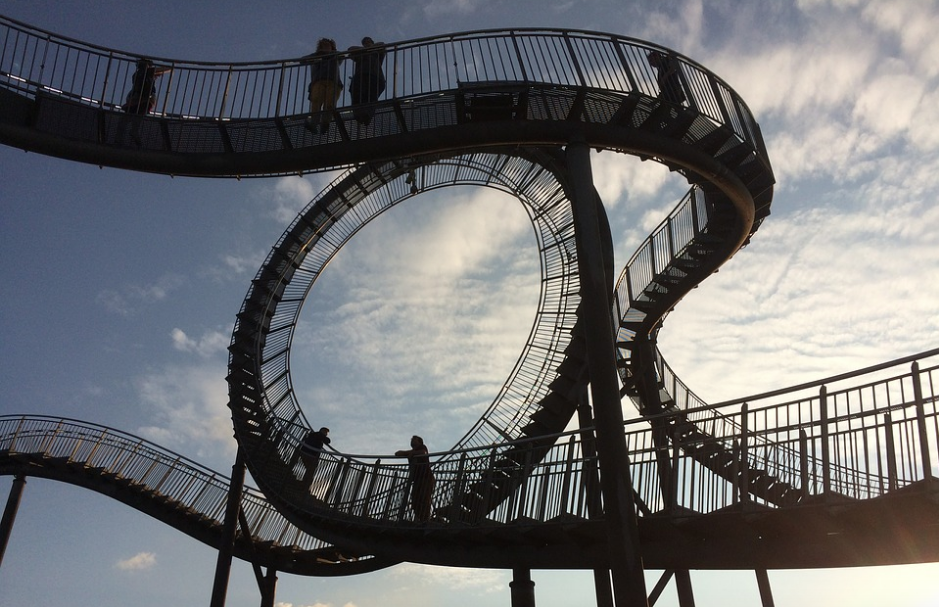— At Work and in Life
by Andrew Hyman

When I was six years old and first learning to meditate, I used to close my eyes and pretend I was on a rollercoaster. Learning to meditate was about as much fun for a kid that age as you can imagine. My first few sessions, I rocked around on that imaginary ride, desperately awaiting my parents’ call that I had sat for long enough that day. But over the next few years I started actually engaging with the practice, and completed my first weekend meditation program at age ten.
I continued doing programs and regularly meditated through high school, though once I got to college, my formal meditation practice fell off. I claimed I was “staying mindful in my daily life,” which, I guess, was somewhat true, but it wasn’t as beneficial as when I was doing formal practice. Entering the working world, I resumed meditating on an almost daily basis, a practice I have kept up ever since.
My rediscovery of meditation coincided with the mindfulness boomlet we’re experiencing now, with well-known figures across business and science extolling the virtues of a regular meditation practice. And there are many reasons why meditation receives such praise. While some of the more extraordinary claims I’ve heard recently (like “meditation as a productivity hack” or an alternative to mental healthcare) may be suspect, there are a number of benefits that a regular meditation practice can definitely confer upon the practitioner. Here are three that I’ve found most beneficial throughout my life:
Staying calm amidst chaos
Learning to keep your cool when it feels like the world is falling apart around you may be the most profound benefit that meditation can offer. Feeling scared, harried, rushed: these are when we often make our worst decisions, or do things we will regret the most. Maintaining composure when external circumstances go wrong not only improves your performance during those trying times, it also projects confidence and stability to those around you. In this way, mindfulness enhances your own performance and your ability to help others, and improves your credibility and efficacy as a colleague.
Letting go of emotional attachments
Working on something imbues it with special importance to us. Whether that’s a child we help raise, an art project we labor over, or an initiative we introduce at work, we’re likely to develop emotional attachments to the objects of our efforts. Sometimes the emotional attachment can be beneficial and rewarding but other times it may set the stage for tumultuous reactivity. At work, while emotional attachment may inspire our best efforts, if our work is criticized, or worse yet, ignored, it can make us defensive and irrational. This ultimately could harm relationships, our career trajectory, and our ability to succeed.
Work is a place where people challenging each other is beneficial; without this dynamic, groupthink and mediocrity result. Mindfulness lets you see that your thoughts and emotions aren’t you, but are merely a manifestation of your mind. This creates a level of detachment. Then, if you can graciously accept the criticism of others, you can use that input to improve the final product, creating a better result and ensuring that people look forward to their next project with you.
Cultivating your deepest wisdom
Faced with a problem, we often latch on to the first plausible solution. Sometimes, if we are complete experts in the topic, like chess grandmasters at the beginning or end of a match, our initial take on the situation may be correct. But problems in real life are rarely as simple as those on a two-dimensional game board, so stopping with our first thought can inhibit our best thinking. We might eventually decide there are good reasons for going with our initial instinct —competing priorities, tight deadlines, personal distractions — but by cultivating mindfulness, we learn to hit the pause button on that first reaction and contemplate the problem further. Making space for deeper thought gives us time to consider second- and third-order effects of any decision, to analyze the whole that our part is fitting in to, and to effectively anticipate the potential negative consequences of any particular action or decision. This will give us confidence in the solution we create, and inspire confidence in others who see that we’ve fully thought through the problem.
Whether I’m facing a long uphill slog, a thrilling fall that leaves me exhilarated, or a twist that turns my stomach into knots, meditation helps me cultivate endurance, equanimity, and courage in situations that might otherwise be overwhelming. I may have imagined a rollercoaster to get through the boredom of my early meditation sessions, but the mindfulness mindset helps me navigate the rollercoaster that is daily life.

3 thoughts on “Riding the Ups and Downs”
Excellent article, Andrew. Thanks!
Andrew:
Thank you for your thoughtful post! Your rollercoaster life sounds exciting and the benefits of mindfulness you describe are spot on. I have read both your father’s and your mother’s excellent books on mindfulness and I can see their influence in your post. The apple has fallen right next to the trunk of your family tree!
And thank you so much for accepting the seat of president of AMT. I look forward to your ongoing contribution and I only wish your Dad could see you now!
Bill Brauer
Member of the Board
Andrew,
I heartily second Bill’s comments! Excellent post—full of keen insight, personal experience, positive encouragement. And, what delightful news that you are taking on a leading role in AMT. Yes, your dad would be grinning away!
Hazel